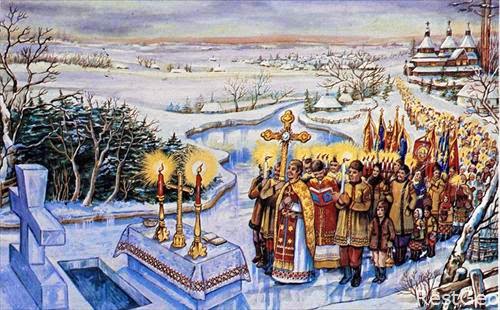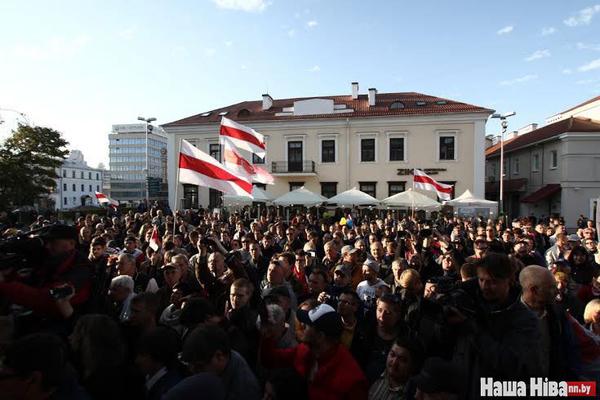It is believed that traditions linked with this festive day appeared more than 2,000 years ago. The emphasis at this feast is on the revelation of Jesus Christ as the Messiah and Second Person of the Trinity at the time of his baptism. It is also celebrated because, according to tradition, the baptism of Jesus Christ in the Jordan River by St. John the Baptist marks one of only two occasions when all three Persons of the Trinity manifested themselves simultaneously to humanity: God the Father by speaking through the clouds, God the Son being baptized in the river, and God the Holy Spirit in the shape of a dove descending from heaven.
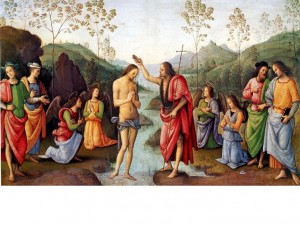
On the day before Vodokhreshche, people observe strict fasting, going without food until dinner when they can partake of meatless dishes, borshch, varenyky, cabbage and fish. Kutya – a traditional sweet grain dish – is ritually enjoyed. The family sits down to the festive dinner after nightfall.
Tradition requires that as much noise as possible is to be made after dinner — children and grown-ups take up sticks and strike wooden fences, empty pots or anything else. It is believed that all this racket will bring well-being, fertility of the land and cattle. The Didukh, a beautifully decorated sheaf of wheat, which has been kept in the house since before Christmas, is taken out and burned “to warm the air” — an invitation for spring to come as quickly as possible.
As the faithful gather, priests normally perform the Great Blessing of the Waters twice – once on the Eve of the Feast (usually in the church) and then again on the Day of Vodokhreshche (January 19), outdoors at a body of water. Following the Divine Liturgy, the clergy and people go in a procession with the cross to the nearest body of water, be it a beach, harbour, quay, river, lake, swimming pool, water depot, etc. (ideally, it should be a body of “living water”). In the cities, the blessed water is dispensed through faucets and barrels where the faithful can fill up their bottles, containers and jars.
The priest blesses the waters at the end of the ceremony. In Ukraine, where winters are severe, many villages still observe traditional customs: a hole (usually in the shape of a cross) is cut into the ice of the nearby river or lake so that the waters may be blessed. The cross is held securely by the priest and dipped three times into the water.
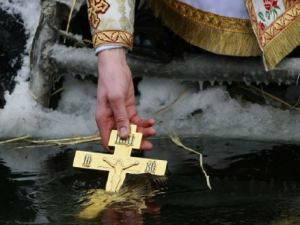
Believing that on this day water becomes holy and is imbued with special powers, many Ukrainians take to bathing or dipping in the freezing water. This practice is said to have flourished since the 1990s.
Participants in the ritual must dip themselves three times under the water, praying and pronouncing the words “In the Name of the Father, the Son and the Holy Spirit”, thus symbolically washing away their sins from the past year and experiencing a sense of spiritual rebirth.
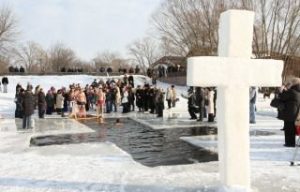
The holy water is taken home by the faithful, and used with prayer as a blessing. People will not only bless themselves and their homes by sprinkling each room with holy water, but will also drink it and offer it to all members of the family. The Orthodox Church teaches that holy water differs from regular water in that the very nature of the water is changed, that is, the water becomes incorrupt and all-healing.
In fact, sacred “Yordanska” (Jordanian) water has long been known for its healing properties. Many Christian rites use blessed water. Newborns are baptized and homes, buildings and institutions are blessed with holy water. It is used to fight sickness and disease. It is believed that holy water has many extraordinary properties that help combat negativity and protect from all evil.
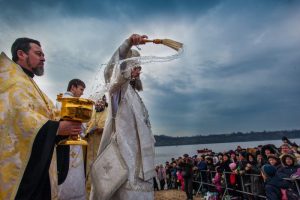
Holy water is carefully stored in Ukrainian homes and, believe it or not, it never spoils or goes stale! Scientists attribute this to the silver particles that fall into the water from the cross during the actual blessing. As a rule, priests use silver crosses to perform this ritual. However, it is difficult to explain this phenomenon when large expanses of water are sanctified. It is obvious that the amount of silver on a cross would not suffice for so much water! And so the purity and clearness of holy Jordanian water remains a mystery to scientists to this very day.
Priests advise the faithful to drink holy water on an empty stomach. It will then have the greatest effect on a person’s health and well-being.
Khrystos Rozhdayetsya! Christ is Born!
Slavite Yoho! Let us glorify Him!




